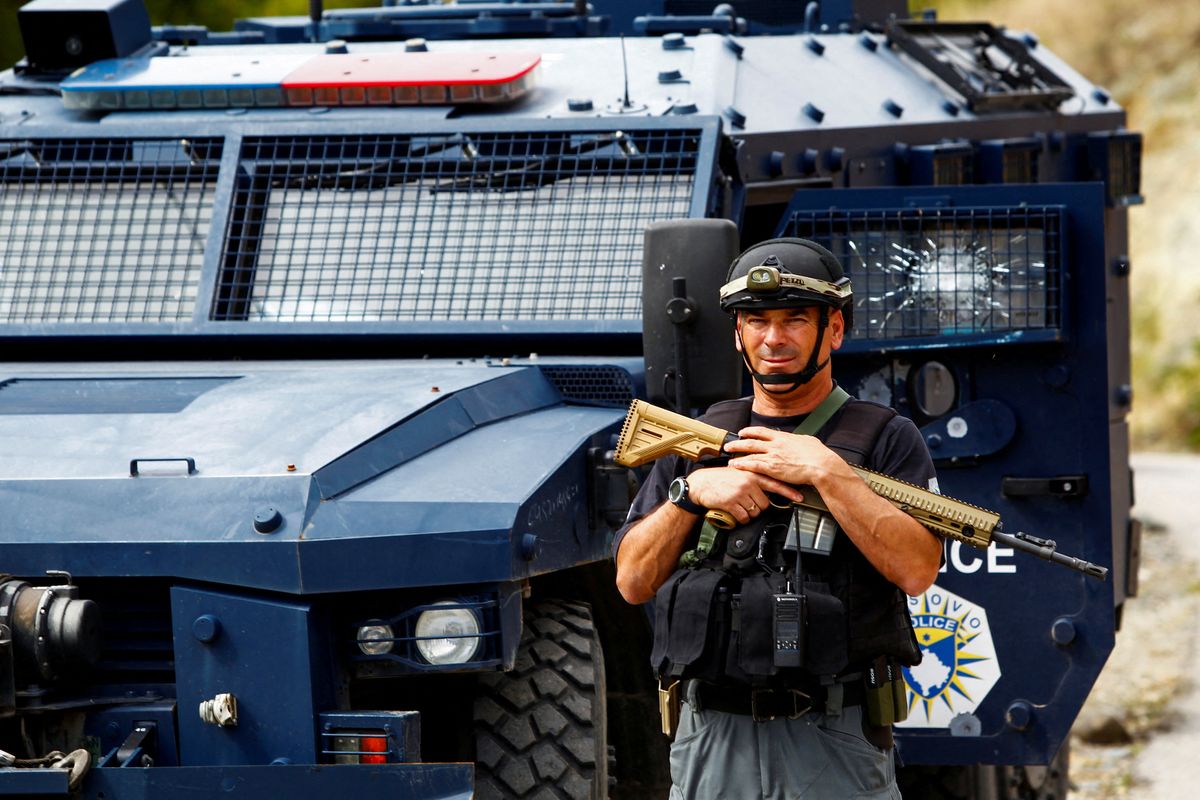Kosovo-Serbia border tensions escalate – here’s what you need to know
On Friday, the US warned of a buildup of Serbian troops along the border.

A few minutes every morning is all you need.
Stay up to date on the world's Headlines and Human Stories. It's fun, it's factual, it's fluff-free.
The backstory: Kosovo has been through a lot of changes since the early 1900s, with parts of it being absorbed by different countries and controlled by various governments and groups until finally becoming an autonomous province of Serbia in 1974. But there were years of simmering tensions between the ethnic Albanians and ethnic Serbs in the region.
In 2008, Kosovo declared its independence from Serbia. This move marked a pivotal moment after a long history of tension between the two. To grasp the whole picture, we need to rewind to the late 1990s when Kosovo’s ethnic Albanians wanted to break away from the Federal Republic of Yugoslavia, which included Serbia and Montenegro. This period saw the Kosovo War from 1998 to 1999.
During that conflict, NATO stepped in to help protect the Albanian majority in Kosovo. After the war ended, there was some peace, but Serbia never officially recognized Kosovo as its own country. There's also a group of Serbs in Kosovo who want more control and see Belgrade, not Pristina, as their capital. This has led to fights over how much power they should have. There have been talks between the two for over a decade, but nothing solid has really come out of them yet.
More recently: Earlier in May, ethnic Serbs in the northern region attacked NATO peacekeepers following a disputed election that put ethnic Albanians in official positions in majority Serbian areas.
Then, last Sunday, a face-off happened when about 30 armed Serbs clashed with Kosovo's police. It all started with an ambush that left one Kosovo police officer dead and another hurt. This shootout took place in Banjska, a village in northern Kosovo, when the armed men barricaded themselves in a Serbian Orthodox monastery. Kosovo's police managed to take down three attackers and catch another one. They also found a bunch of military gear, vehicles, uniforms and weapons where they were hiding.
Banjska is mostly Serbian, like many other villages in the north of Kosovo. Kosovo's Prime Minister Albin Kurti called this a "terror attack" and blamed "Serbian criminal gangs" on his Facebook page. Kosovo’s president has accused Serbia and its president of being behind the attack, but Serbia denies being involved. No group has come out to claim responsibility.
The development: On Friday, the US warned of a buildup of Serbian troops along the border. After this deadly clash, Kosovo is concerned about its territory and wants Serbia to move its troops away from their shared border. Kosovo's government made this demand directly to Serbia's President Aleksandar Vucic and Serbian institutions. Kosovo has accused Serbia of planning a Crimea-style move in the region, referencing Russia’s annexation of Crimea from Ukraine. President Vucic, on the other hand, has said he doesn't plan to send Serbian troops into Kosovo because it might make it harder for Serbia to join the EU. Vucic on Saturday pulled some of the troops away from the border after warnings of consequences by the US.
The international community is paying close attention to the situation, especially the US. The world's biggest economy has expressed concern over Serbia's military deployment, saying it’s destabilizing the region, and called on the two to go back to efforts to normalize their relations. Kosovo is working with its international partners to safeguard its “territorial integrity” using anti-aircraft systems and heavy artillery. NATO is also in the mix, authorizing additional forces sent to the region to address the escalating tensions.
Key comments:
"We call on President Vucic and the institutions of Serbia to immediately withdraw all troops from the border with Kosovo," said the Kosovan government in a statement. "The deployment of Serbian troops along the border with Kosovo is the next step by Serbia to threaten the territorial integrity of our country."
"Kosovo, in coordination with international partners, is more determined than ever to protect its territorial integrity," said the Kosovan government.
“According to Kosovo authorities, at least 30 people were involved in this attack which resulted in the death of a police sergeant a Kosovo Police Sergeant,” said US national security spokesperson John Kirby to journalists last Friday. “We believe that this is a very destabilizing development and it’s basically been taking place over the past week or so. And we are calling on Serbia to withdraw those forces from the border and to contribute to lowering the temperature.”
“Why this would be beneficial for Belgrade? What would be the idea? To destroy our position we have been building for a year? To destroy this in a day? … Serbia does not want war,” Serbian President Aleksandar Vucic said.




Comments ()